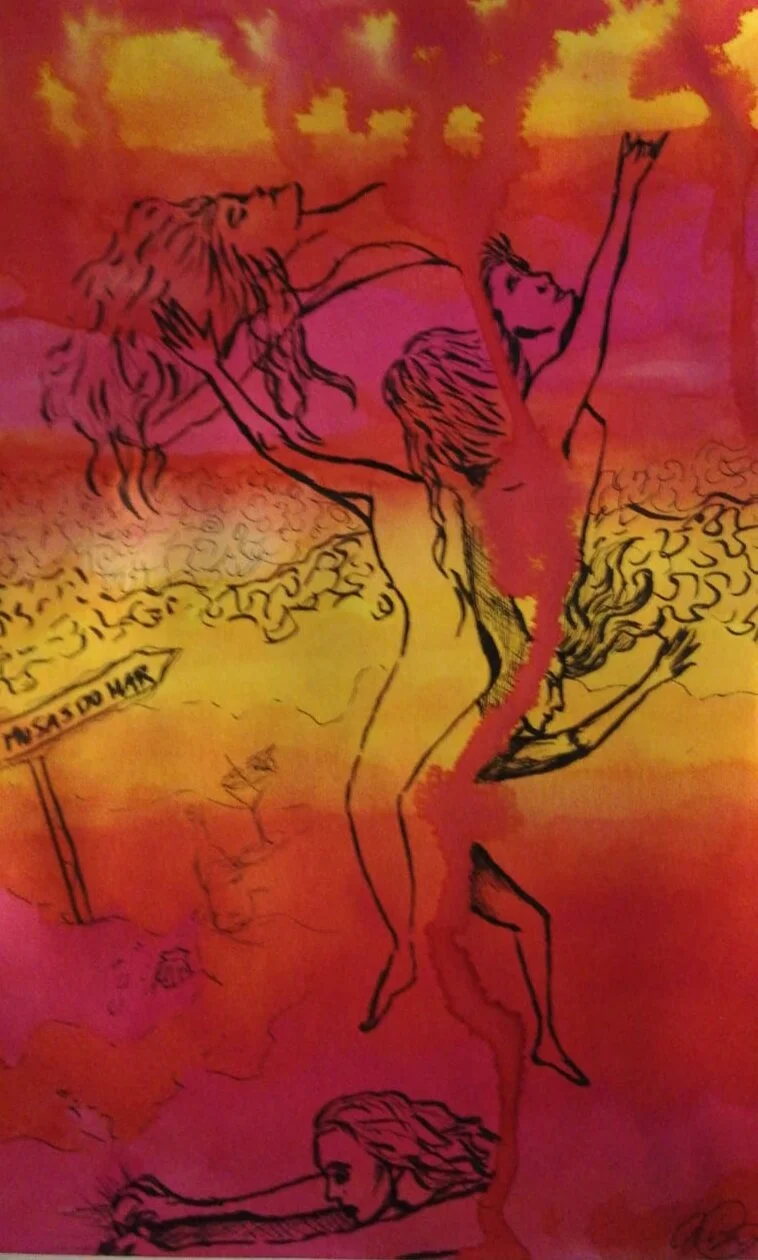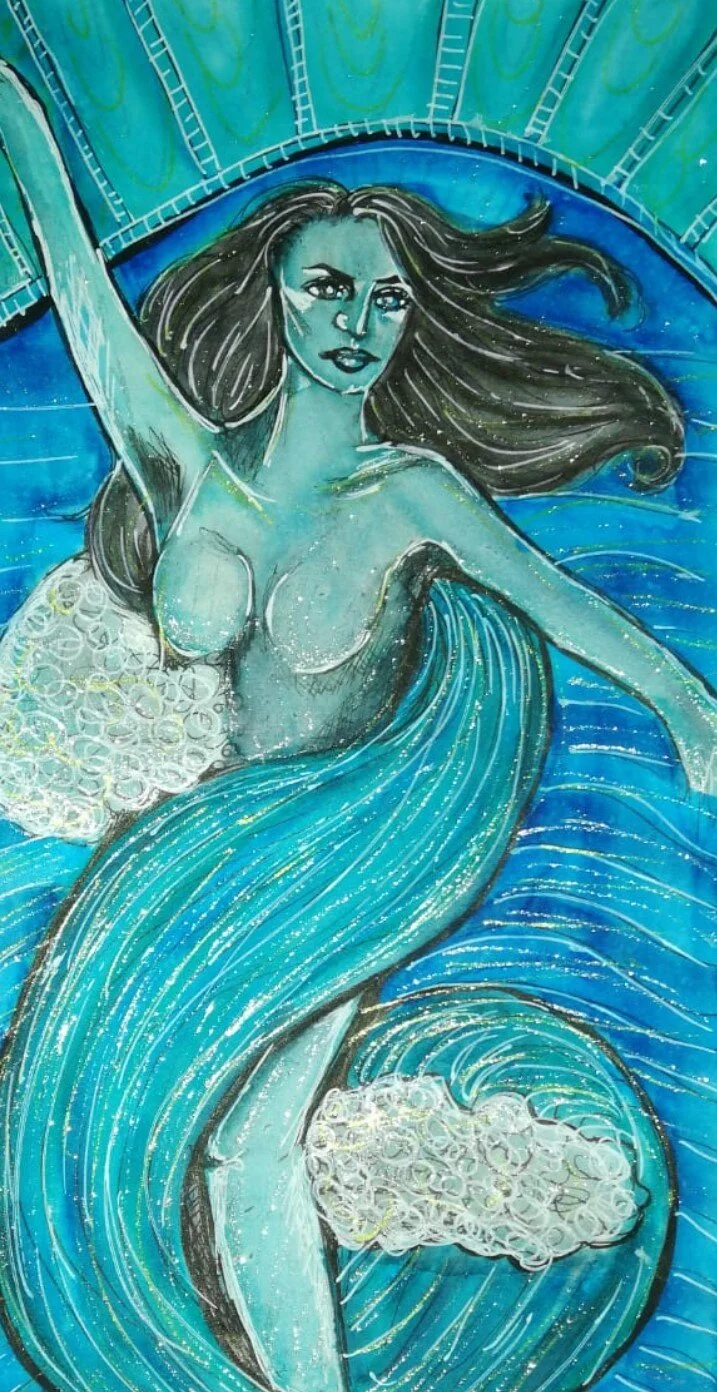Bells
And thus on that delightful day my worries washed away with a visit to the three sisters Belle. I once crossed paths with the eldest during a particularly crass predicament. To protect my pride, I'll omit what occurred that day; but by the end of it, I owed the dame a few dimes. Penniless artist that I was, there was no way for me to pay her; but she assured me that the debt would disappear if only I would paint a portrait of her and her two younger sisters. This being my mission on that amicable day, I aimed to please and prepared to impress.
Preferring to travel the scenic route, I ventured through the woods to their manor rather than crossing through the impoverished district. It was a quaint little village they lived in: a seemingly innocent and harmless place, though rumours had spread far and wide of the secret debauchery and hedonism that prospered in the streets of the night. But whether or not those rumours were factual had no relevance, because the village went quite unnoticed in the shadow of its towering neighbor, a town devoted to the celestial, committed to the scriptural doctrine of the Lord. It was a town where the devout worshipped day and night, where the sanctity and the divinity of the Almighty were protected at all cost. Their church had a bell tower so tall it cast a looming darkness over the sisters’ abode at precisely midday, the very time that the bells chimed their tune twelve times in a row—or so the tale was told by the eldest. In relation to the peculiar occurrence described, she had a specific request she wished I would adhere to when painting their portrait: apparently, I ought to wait for the shadow to sweep over the estate before planting a single stroke on the canvas; and once the bell begins its grand toll, I ought to memorize the exact complexion of each sister’s face, and immortalize that pure reaction, capturing the fleeting sublime and framing it for the infinite. It was a daunting task, for if I failed to live up to expectations, my debt would not be forgiven.
Arriving at eleven, I rang the bell, waiting for an answer. The youngest Belle opened the door in an astonishing white wedding dress. Undeterred by my confusion, she smiled widely and grabbed my hand, gliding me into their hall graciously. She informed me that her eldest sister would soon come to get me, and off she went in a grandiose gesture, her feet trilling up the steps like a lark in song. At the top of the steps was a woman in black with a grave expression who rushed away beyond sight as soon as our eyes locked.
My mind had little time to process what had just happened, because suddenly the eldest was there in a shockingly modest brown dress, welcoming me to her home, taking my arm and leading me into the tea room, playfully chastising me on being early, subtly stroking my arm with her slender fingers. She sat me down on a chair and told the maid to make us some coffee, and then sat down opposite of me and leaned her chin on her crossed hands, gazing into my eyes curiously. A bit dazed by my strange welcoming, I was speechless for quite a while. To fill the silence, she recounted a brief history of the manor: it had been with the Belle family for quite a few generations, with many an interesting story gracing its halls; and since father Belle’s tragic death, the estate had rightfully been passed down to her. Unfortunately, father Belle’s unruly gambling addiction had left the sisters with practically no wealth, so in order to support her sisters, the eldest had to use unorthodox methods, of which she preferred to discuss no further.
The black choker around her neck whispered what I already knew from personal experience: mistress of the night, courtesan of the courtly class. I stared at her stance, the way she presented herself: it reflected righteous strength and determination, almost to excess—as if she attempted her very best to hide any weakness that may have come across. Yes, there was a certain facade in display, by nature unabashed. Her hands remained crossed though her chin no longer leaned on them, but rather was raised high, above all judgements of prudence. I noted now why I heard others talk of her piousness so bluntly: it shone so surely in the saintly show that was her demeanor; how demure, how modest she was—when under the surface she harbored the life of a demimondaine, shamelessly shallow and superficial.
But yet, I felt the layers of her character did not end there, for I was sure there lay a wonted want, an innate desire deep within that kept her so willful and fierce—perhaps a hope for change, or a switch in circumstance: and perhaps the ideals she pretended to uphold were the very ones she wished she could sincerely adhere to.
As these musings mingled in my mind, her gaze never left my eyes, her expression mysteriously knowing. Slowly, her hands uncrossed and her fingers steepled, and in my portrait this confirmed what I suspected: a paradigm of faith genuine in form was a hidden fixation of hers that she happened to flaunt, yet it was something she was not ready to commit to. And evidently, it wasn’t even a possibility, for due to their dire financial dilemma, there had to be some way to provide.
The coffee arrived, and our interlocked gaze melted with interruption. As we sipped our coffee cautiously, I inquired whether there were anything her younger sisters could do to help ease their financial burden. The eldest told me their mission was to marry into wealth, and the middle-born succeeded in doing so. And what a lamentable heartbreak she went through when her husband perished only a few months after the wedding. Ravenous with greed, the scornful family snubbed her inheritance away; although the poor girl barely noticed, struck senseless by a lashing sorrow. Ever since then she’d turned into a complete recluse, barely coming out of her room, reading the days away. She meekly managed attended the funeral, held in the towering church of the neighboring town; she sat woefully alone on opposite ends from his feral family, who spit out possessive glances at her with insulting pretence. After that day she’d refused to wear anything else but her pitch black widow’s gown. The most melancholic part of it all was that she’d been writing a letter to him every day, sending them off to decay on his grave. By this point the grave apparently looked like a rubbish heap of wailing words that would never be read and wasteful wishes that would never come true. What a pity, I thought, that she chose to fritter away her prospective future by pining for her fading past.
As for the youngest sister, she’d been desperately trying to get married for years, and had apparently gone mad in doing so. At first, there were many suitors willing to marry her; her options were plentiful. But she refused them all, her reason being that none of the men were the husband of her dreams. It seemed that she had often dreamt of a very specific man claiming to be her future husband, and she firmly chose to wait for that man to come to her — and in doing so, chose to wait forever. It was quite devastating when her mind escaped completely into a fairytale land of fantasy; since then she wore only her wedding dress, every day, in hopes that the man of her dreams would manifest into existence and elope with her. She suffered from delusional idealism, such a poignant condition.
Our coffees finished, the eldest went off to assemble the sisters in the drawing room, as it was approaching midday. I transported my equipment to a proper spot in the room, in front of a luxurious lounge chair. One by one the sisters entered: first, the youngest, with a radiant smile on her face and her arms splayed wide, she pranced forth, her hands setting the tempo to the tune her steps emitted; next, the middle-born, head bowed with a magazine hugged to her chest, she walked forth solemnly, her steps echoing the gloom of her heart; and finally, the eldest strutted in proudly, her head held high, her steps expressing her solidity.
The three stood in a line in front of me, awaiting my direction. I advised them to get into a comfortable, natural pose. Without much thought, the middle-born soberly sat herself down in the lounge chair, and the youngest followed suit, sitting next to her and putting her arm around her older sister. With no more space on the chair, the eldest searched around the room, and dragged another chair from the corner to sit by her sisters.
Before I started I decided to ask them a question to lock their portraits in place. I requested a simple phrase of faith, some belief or attitude that they had gained from their experiences.
“Hope remains most certain when chance is nonexistent,” replied the youngest.
“The wisest choice is to live in avoidance of the regrets to come,” replied the middle-born.
“Sacrifice is the paragon of virtue, and the doom of dignity,” replied the eldest.
With only minutes till the bells’ twelve tolls, the sisters got into their final positions: while the youngest and middle-born were browsing through the magazine, the eldest focused her gaze on me, her fingers half steepled in a stagnant stance, never quite prepared to cross into permanent prayer.
Ding-dong began the bell, and suddenly I apprehended why it was the eldest coveted a portrait of exactly this. Though unseen, the darkness became palpable in the room, and everything froze. The younger sisters had been flipping through the magazine flippantly when the bells started ringing. The youngest who was ever so close to moving on to the next page, was distracted by the chimes, and her hopeful gaze turned to the window: all she heard was wedding bells. The middle-born was preparing to flip back a few pages, when the bells clanged in her ears like reverberating reminders, and her gaze remained firmly on the magazine: all she heard was funeral bells. And the eldest, her convincing pose endured through the bells’ beckoning, unflinched and unfettered by its call — but hidden deep within her eyes, I could see her desperation for escape: all she heard was a sacred duty summoning her.
They sat still as sculptures; and I imagined them, sculpting their dreams into designs worthy of consummation, weary of ever weaving a vision clear enough to cement into the dark and dreary desolation of their reality. I felt their longings and their yearnings, forever unfulfilled, prickling at my skin: for you cannot turn back time, you cannot bring dreams to life, and you cannot escape responsibility, even if it were the only resolve to your well-being. So I painted this hidden sorrow as best I could, unwilling to reveal everything I saw, for it would be too pitiable a portrait. I chose to shroud it with mystery instead, the same mystery I felt when I first arrived, untouched by their gruesome history. But still, behind the guise I included the broken dreams the bell propelled within them, for I was assigned to paint a portrait of reactions, namely reactions to a life that should have been.
And thus it was settled, with the unsettling portrait finished, though forever unresolved. My debt would be forgiven, and the three sisters Belle would have an eternal reminder of what their life could never be.




